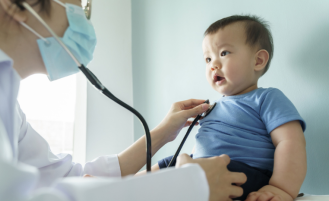Valuing Cultures and Traditions in Honor of Indigenous Peoples’ Day
In observance of Indigenous Peoples’ Day on Oct. 11, Overlake family medicine provider Gregory Maddox, MD, who is on staff at our primary care clinic in Newcastle, discusses how growing up as a member of the Choctaw Nation of Oklahoma helps him treat American Indian and Alaska Native patients.
It is no secret that American Indians and Alaska Natives face significant health disparities. We often have chronic and more complex diseases. In fact, Native men are 4.5 times more likely to die of COVID-19 than their white counterparts. These disparities are due to the historical trauma faced by this population and our country’s history of medical practices that have been detrimental to minority and marginalized populations.
There are currently 45,000 to 55,000 American Indian and Alaska Native people living in the greater Seattle area who warrant some level of medical care. As an Urban Indian, I respect and seek to understand these practices. While there are many different cultural Native practices, I believe that Native people would benefit from having a Native doctor, which has been shown to generate better health outcomes. Many of the American Indian and Alaska Native people living in Seattle are not from local tribes, but instead come from tribes around the country—relocated several generations ago with a promise of work and housing. Because so many Urban Indians have moved from their traditional or reservation lands, we now often lack access to healthcare, which is often linked to tribe-specific treaty rights. Regardless of origin, we value our culture and come into the Western medical system with our own perspectives, rituals, practices, and values.
I’m passionate about treating American Indian and Native Alaskan patients. I specialized in family medicine because I saw the need growing up on my family’s farm in rural Oklahoma, in a community where family doctors do everything—from delivering babies to treating the diseases of old age. Because of that, I’ve learned to do many procedures and try not to send my patients to specialists if I can do them myself.
When treating Native patients, we are often working with a different sense of time and history. I see people who are often skeptical of Western medicine, so I have adapted my practice to incorporate traditional medicine into their treatment when appropriate. I believe multiple approaches and perspectives should work together, in the spirit of obtaining a healthy outcome. With my Native patients, I highlight traditional approaches they may be familiar with and sprinkle in what I’ve learned in medical school and residency.
My practice in Newcastle—the Overlake clinic located the furthest south in our coverage area—is easily accessible to many of my patients who have moved out of Seattle into cities in south King County. It is a pleasure to be able to provide them the access and resources of the Overlake hospital system.
Currently, the most important thing I can offer my patients is the COVID-19 vaccine, which I encourage them to get. I’m happy to talk to my patients about the vaccine, to show them that I got mine, tell them that my dad got his, and demonstrate that we’re healthy and thriving. Given our country’s history, I understand the vaccine hesitancy associated with Native populations. But the vaccine is effective and it’s so important to be vaccinated against this deadly virus.
In honor of Indigenous Peoples’ Day, I urge everyone to seek the quality medical care they deserve. Please don’t hesitate to reach out for an appointment.









